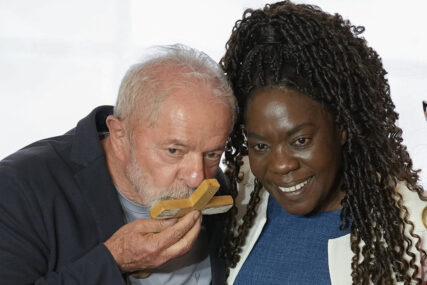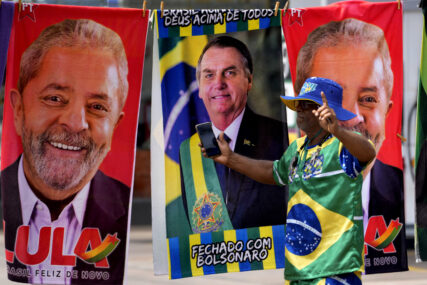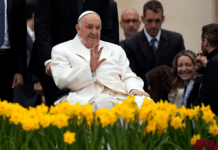But, Vitorino also noted, when both candidates have such a high unfavorability rate among undecided voters, a warlike campaign may lead them to just stay home on election day. “That is a real risk.”
Much of this war is being fought online, by supporters, and they are not exactly following the rules of a fair fight.
Two days before the first round, on Oct. 2, a viral video, later said by its creator to have been taken out of context, was heavily promoted by Bolsonaro supporters ahead of the first round of elections. The clip showed digital influencer Vicky Vanilla, a satanist, declaring support for Lula and predicting his victory.
“That is a spiritual war,” declared Bolsonaro ally and Congresswoman Bia Kicis, along with a link to the video on her social media.
Brazil’s former president, Luiz Inacio Lula da Silva, left, who is running for re-election, kisses a cross he received from Catholic nun Sister Rosa during a meeting with members of the Catholic Church, in Sao Paulo, Brazil, Monday, Oct. 17, 2022. Da Silva will face Brazilian President Jair Bolsonaro in a presidential runoff on Oct. 30. (AP Photo/Andre Penner)
“Aimed at dispelling the fake news, the Lula campaign created an ad with the caption ‘Lula is a Christian, share the truth.’ The second of four bullet points states ‘Lula doesn’t have a pact with the Devil nor has he ever spoken with him.” The PT has also been widely publicizing photos of da Silva with Pope Francis.
The viral video was an attempt by Bolsonaro supporters at “Lula’s literal demonization in a country that is home to the largest Pentecostal and Catholic populations on the planet,” according to Andrew Chesnut, a professor and religious studies expert at Virginia Commonwealth University.
Two days later, in a counter-attack by da Silva’s supporters, social media was flooded with pictures and videos showing Bolsonaro in Masonic lodges. Soon the phrase “Bolsonaro is not a Christian,” began to trend, overtaking references to “Lula-Satanista.”
After that, a picture appeared with Bolsonaro side by side with freemasons in front of an image of Baphomet, a divinity supposedly associated with the Knights Templar and later incorporated by occultists. That picture was later proven to be a fraud, but posts connecting Bolsonaro with satanic rituals continued to be published over the next days.
“The Brazilian left wing was unprepared for these digital attacks, and without a strategy for countering fake news and moral panic,” said Magali Cunha, a PhD in communications and the general editor of fact-checking site Coletivo Bereia.
That left a vacuum for supporters to share misinformation. Cunha, who is also a collaborator with the World Council of Churches, said the posts about Bolsonaro and the Freemasonry came from digital influencers connected to the Left — not exactly from Lula’s entourage.
“In that digital war, it makes sense, especially when it comes to winning voters who still have not made a decision,” she said.
A demonstrator dressed in the colors of the Brazilian flag performs in front of a street vendor’s towels for sale featuring Brazilian presidential candidates, current President Jair Bolsonaro, center, and former President Luiz Inacio Lula da Silva, in Brasilia, Brazil, Tuesday, Sept. 27, 2022. Nearly a dozen candidates are running in Brazil’s presidential election but only two stand a chance of reaching a runoff: former President Luiz Inacio Lula da Silva and incumbent Jair Bolsonaro. (AP Photo/Eraldo Peres)
That’s not an excuse to stoop so low, argues theologian Leonardo Boff, a public intellectual with the Latin American Liberation Theology movement and a fierce critic of Bolsonaro.













